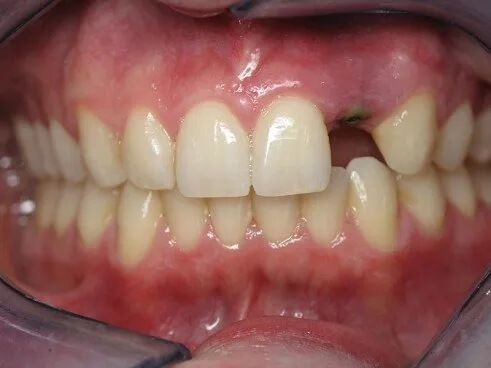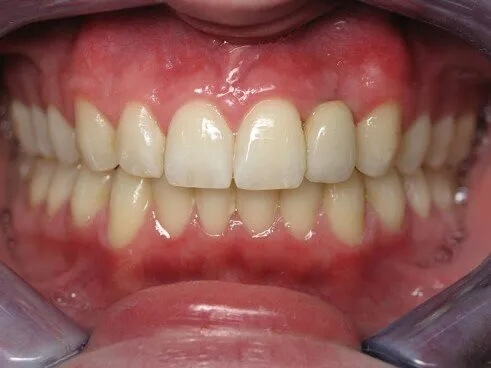What are dental implants and how do they work?
Dental implants are made up of two parts; a titanium screw that acts as "the root" of the tooth, and a custom porcelain crown that screws into the titanium implant to match the rest of your teeth and retains your bone structure and bite.
Who is a good candidate for dental implants?
Implants are performed on patients that have lost their adult teeth (permanent teeth). Typically, these procedures are only performed on people ages 22 and older, due to not wanting to disrupt the natural growth of a person's mouth. However, there are some restrictions that we take into account when assessing for implant candidacy. For example, patients that have extreme bone loss that cannot be replaced by a bone graph may not be implant candidates. Regardless, we strongly believe in implants as treatment to preserve a patient's oral health and smile, so we will try to take every avenue possible to make them work for you if you are a candidate!
What is the difference between mini implants and full dental implants?
Mini dental implants have a similar structure to regular implants, but are much shorter and thinner. They have often been used in the past by dentists to retain a temporary prosthetic, and are NOT designed to be a long term solution to tooth/bone loss. Mini implants do not hold as strongly in the bone as regular implants, making them more susceptible to falling out or incurring infection. However regular implants have been scientifically proven to be very strong and often last a lifetime when taken care of properly.
What is the dental implant process like from start to finish?
Once a patient has chosen implants as treatment, a panoramic x-ray and CBTC scan is taken of the mouth to assess the bone and placement of the implant. The doctor will then determine which kind of regular implant is best fitting for you, and either extract the tooth that is being replaced or prepare the area for surgery. A single implant typically takes an hour to 90 mins to insert into the mouth. A period of at least 4-6 months of healing is needed before the implant crown can be placed within the implant. Once the healing process is complete and the bone has fully healed around the implant, a scan of the implant is taken in preparation for manufacturing the crown. Once we receive the crown make from our renowned dental laboratories, the crown will be place (or "screwed") into the implant and adjusted to match the rest of your smile. You can then go back to chewing and biting as you normally would!
How long do the dental implants last?
The success rate is very high for dental implants. They can last you your lifetime. There are certain things that could cause an implant to fail. One of them is poor oral hygiene, so not taking care or keeping it clean, not coming in for regular checkups, or there could be some medical conditions that could cause the implants to fail. Coming in for regular checkups and making sure you get it checked up would be the best way for the implant to last your lifetime!
What condition would cause a dentist to recommend dental implants?
Sometimes patients may have a condition where their teeth, gums, or bone are breaking down, making their teeth less functional. While we try to save the teeth as best as we can, certain situations may require a dental implant. Benefits include restoring the ability to chew, smile, and overall health, as better eating leads to better health!
Why is my medical history important?
Medical history is crucial because certain conditions may affect the healing process of dental implants. A thorough medical history helps ensure the best success for your implants.
When will bone grafting be required?
If a tooth has been missing for a long time or recently extracted, there may be bone loss. To ensure a predictable and long-term successful implant, a certain amount of bone is needed, which may require bone grafting.
When choosing new artificial teeth, what options do I have, and what are the pros and cons of each?
There are two options for implant-supported artificial teeth: fixed and removable. Fixed teeth remain in place day and night, feel like natural teeth, but are more expensive and require diligent cleaning. Removable dentures, connected to implants, are more stable than regular dentures and easier to clean but must be removed at night.
What are the costs and financing options involved in dental implants?
Costs vary depending on the procedure. Single implants cost less, and multiple implants cost more. We offer financing options to spread payments over time, making it more affordable based on your needs.
Do most insurance plans cover the costs of dental implants?
Coverage varies, with about half of the insurance plans covering part of the cost of dental implants. However. most insurance plans DO NOT cover implants.
How can I schedule an appointment to talk to a dentist about dental implants?
To schedule an appointment, call our office for a consultation or new patient exam so the doctor can evaluate your needs.

Request a Dental Implant Visit!
Before:

After:



